Aug 20, 2025 – Religious Leaders’ Meeting, Weekly Dharma Assembly, Peace Research Seminar
Hello. Today is the day for the monthly religious leaders’ meeting for national reconciliation and peace, as well as the Weekly Dharma Assembly where Jungto Society members reflect on their practice.
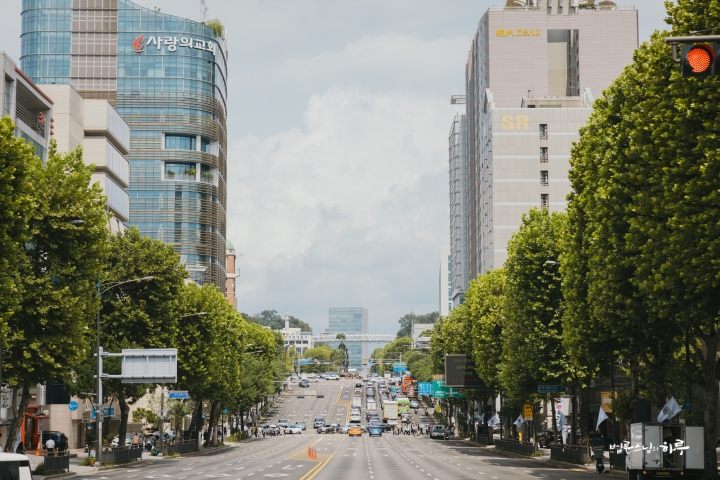
After completing morning practice and meditation, Sunim headed to the Jungto Social and Cultural Center for the religious leaders’ meeting. Pastors, priests, bishops, and religious teachers arrived one by one at the basement dining hall.
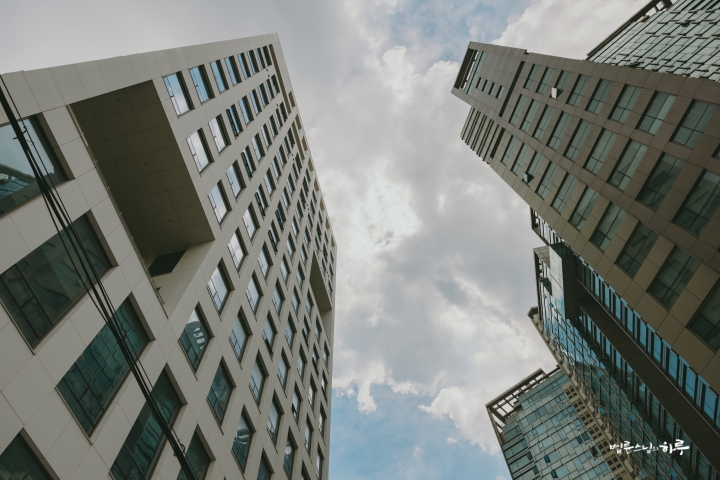
After having breakfast carefully prepared by The Peace Foundation staff, they moved to The Peace Foundation conference room to continue their conversation.
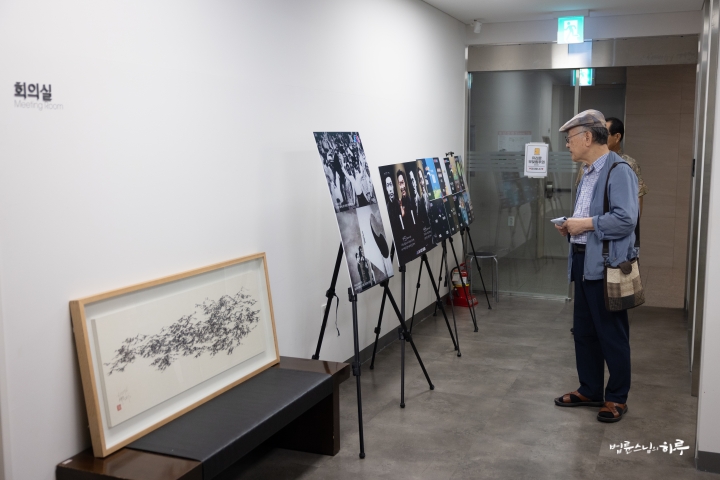
Over tea, they watched a video together about the dialogue and exchange with Sri Lankan religious leaders on the theme of peace and reconciliation last July.
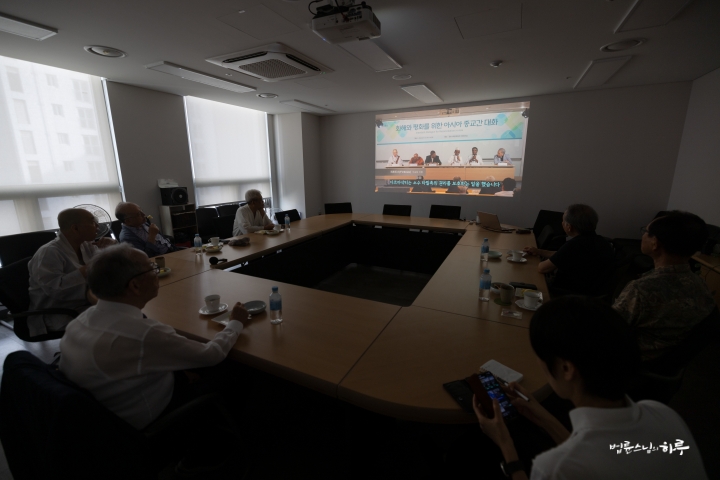
After watching the video, everyone shared their reflections from that time.
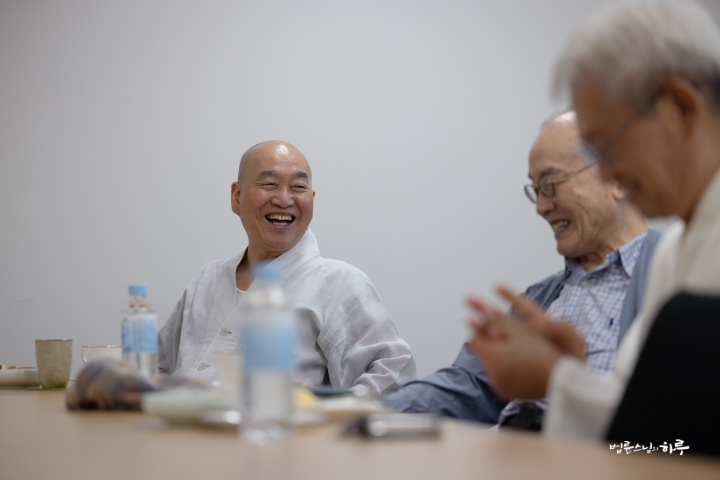
“It was a very inspiring meeting. I learned a lot about what role religion should play for reconciliation.”
“I was truly amazed that religious leaders united to bloom flowers of reconciliation amid 30 years of civil war. I thought such a sight was nothing short of a miracle.”
“The head of the Jogye Order said he thought interfaith cooperation only happened in South Korea, but was surprised to learn it was also happening in Sri Lanka. It was even more meaningful that our experience was shared with all Korean religious leaders by visiting the top leaders of each denomination on the last day.”
“While the authority of religious leaders has greatly declined in Korea, in Sri Lanka religious leaders still maintain trust and authority from the people, enabling them to lead reconciliation. This stark contrast made me reflect deeply on the role of religious leaders.”
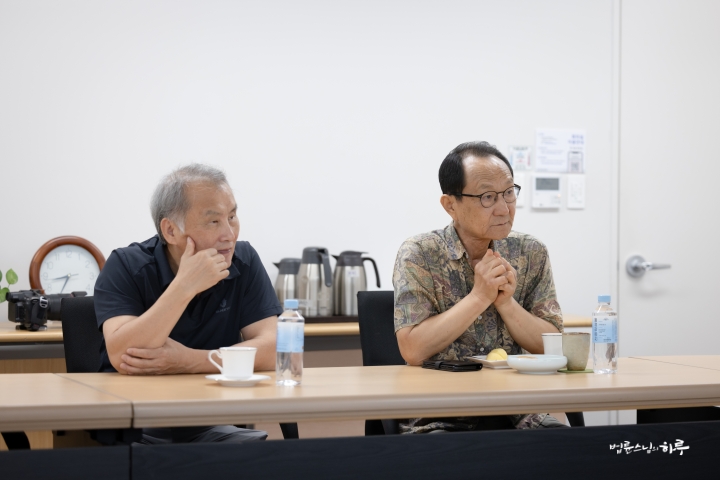
They then engaged in earnest dialogue about today’s topic – peace on the Korean Peninsula. First, Sunim discussed how to open channels of dialogue between South and North Korea.
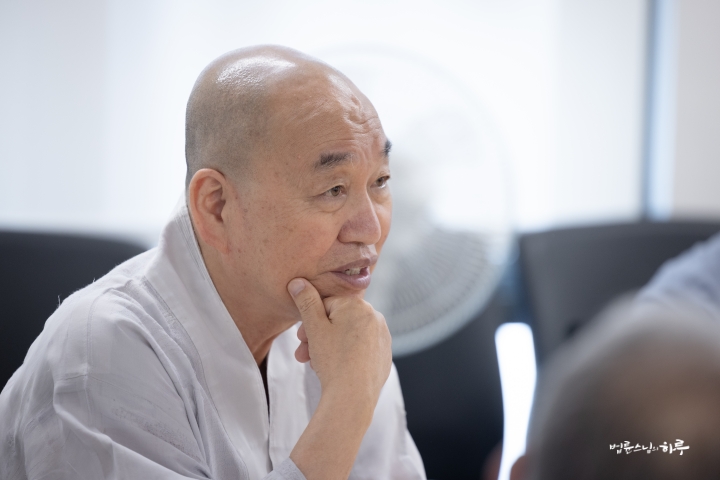
“The current situation makes even communication between the two governments difficult. So I met with officials from both governments and emphasized that restoring the inter-Korean emergency hotline is absolutely necessary. Emergency communication channels are essential even during war or between hostile nations.
The First Priority Is Restoring the Emergency Hotline
Inter-Korean relations don’t seem likely to improve easily in the short term. When I went to the United States last June, U.S. government officials asked how to bring North Korea to dialogue. However, North Korea’s position is that they’ve already tried bilateral, trilateral, four-party, and six-party talks, but South Korea and the United States overturn previous agreements when administrations change, so they can’t trust them. While they’re using harsh language, rather than simply refusing dialogue, it should be seen as a signal that North Korea needs time before coming to the table. I think the fact that they’re responding at all is a positive sign, rather than saying nothing. North Korea’s recent statement that ‘partial postponement of joint military exercises is meaningless’ itself has meaning. If it truly had no meaning, there would be no reason to say so. So we need to wait a bit longer.
What the South Korean government should do now is eliminate the hostile actions of the previous administration one by one. However, we should avoid publicly mentioning North Korea’s actions, like saying ‘When our government removed loudspeakers, North Korea also removed theirs.’ If North Korea refutes this, it could put our government in an awkward position. While it may take time, what’s important is for us to eliminate the hostile atmosphere step by step. We should pursue this steadily without being too hasty. Since President Lee Jae-myung also has the will to improve inter-Korean relations, it would be good to watch a bit longer.”
After hearing Sunim’s explanation, Father Kim Hong-jin smiled and said:
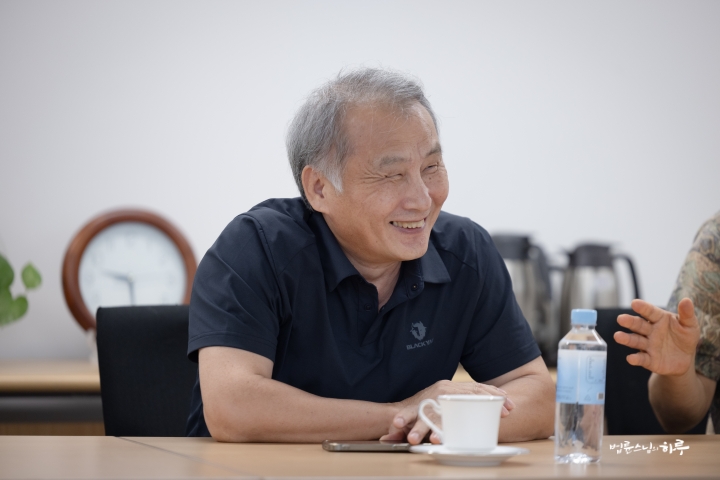
“That’s a good sign. It’s like night and day compared to when former President Yoon Suk-yeol flew drones over Pyongyang.”
Sunim then shared observations from the North Korean border during a recent Northeast Asian history tour. The religious leaders asked various questions about North Korea’s current situation. Sunim emphasized the need to observe trends for a while to understand the gap between reports of difficult living conditions for ordinary people and improving trade figures.
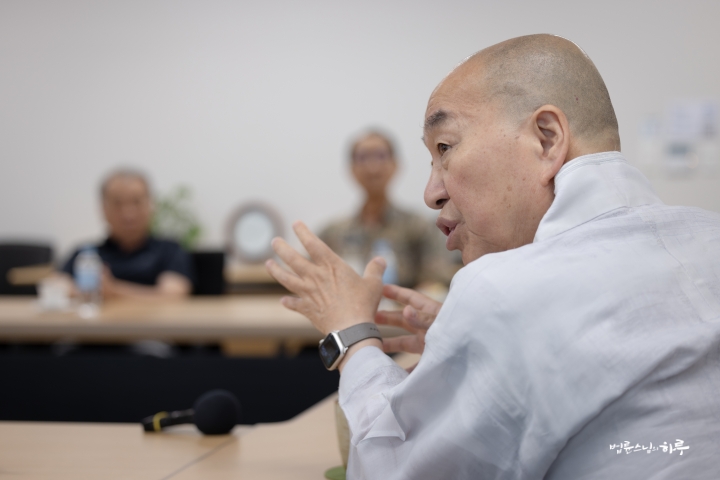
“I recently went on a Northeast Asian history tour and saw the North Korean border area. Personnel and material exchanges with China were actively taking place. Construction was also progressing actively. Not only in Pyongyang and Wonsan, but also along the Yalu and Tumen rivers where no new buildings had been built for 30 years, many high-rise apartments had been constructed. Building colors had changed to be more vibrant, and new houses could be seen even in small villages in remote areas.
North Korean Economy Shows Both Growth Signals and Crisis Signs
The exchange rate has risen from 8,000 North Korean won per dollar to currently 40,000 won. While news reports say residents’ lives are difficult, construction and infrastructure development continue, suggesting the national economy seems fine. This would be evidence that the North Korean government has financial resources. North Korea is sending military forces and workers to Russia, and with an estimated 200,000 North Korean workers dispatched to China, funds may be flowing in through them. Items requested by the North Korean government continue to enter from China, and while payments used to be delayed, now they’re making advance payments smoothly.”
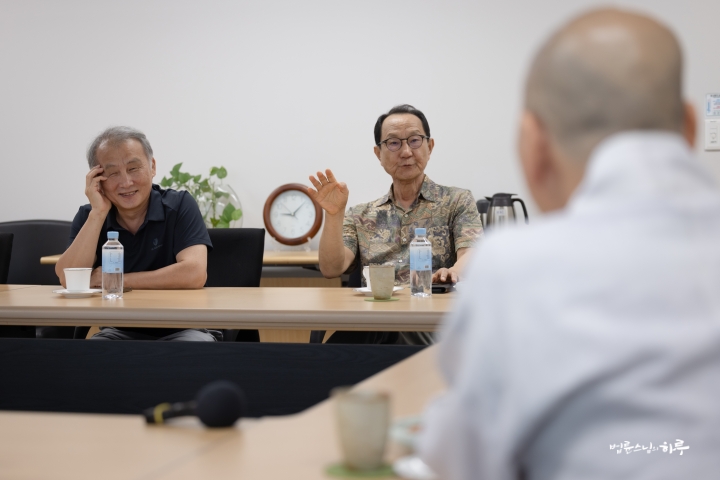
“Could it be money earned from selling North Korean weapons to Russia?”
“That’s not certain.”
“If the exchange rate rose from 8,000 won to 40,000 won, that’s a huge increase.”
“With the exchange rate skyrocketing, prices can’t help but rise. When prices soar, ordinary people find it difficult to live. When Peace Foundation experts gathered for discussion, opinions were divided between those saying the North Korean economy has improved and those saying it has worsened. Previously opinions converged, but now positions differ between those hearing news from ordinary people and those evaluating the North Korean economy through trade figures. Experts reporting on ordinary people claim the North Korean economy is in a very difficult situation like during the Arduous March period, while experts analyzing trade figures claim the economy is growing rapidly.”
“Then that’s evidence of a huge wealth gap widening in North Korea.”
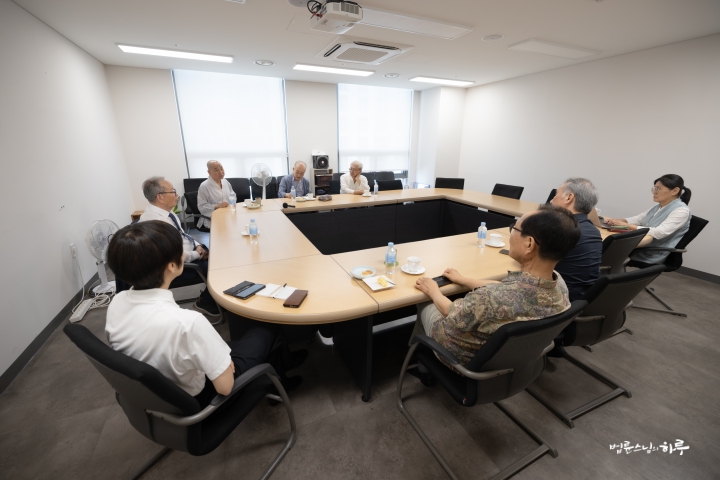
“That’s right. The current reality in North Korea is that those struggling can’t even eat properly, while the wealthy carry luxury handbags.
If Ukraine and Russia reach a ceasefire, even if North Korean combat troops withdraw, engineering units will be deployed on a large scale. In this process, a significant number of North Korean workers could be dispatched to Russia. Russia has a severe labor shortage. But since North Korea is also sending workers to China, I think reopening the Kaesong Industrial Complex would be difficult. However, North Korea is reportedly interested in establishing high-tech industrial complexes. But they no longer seem interested in simple manufacturing. In that regard, even if the Kaesong Industrial Complex reopens, some of the industrial content would need to change.”
Next, Teacher Park Nam-soo expressed concerns about the domestic political situation where the goals of national unity and eliminating insurrectionist forces are conflicting. With opinions divided even among religious leaders, it was clear that achieving national harmony would not be easy.
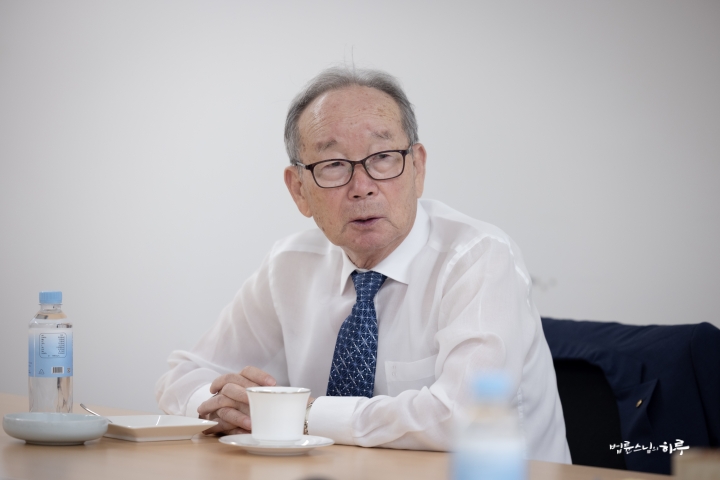
Finally, after sharing perspectives on the upcoming Korea-U.S. summit scheduled for the 25th, the meeting concluded.
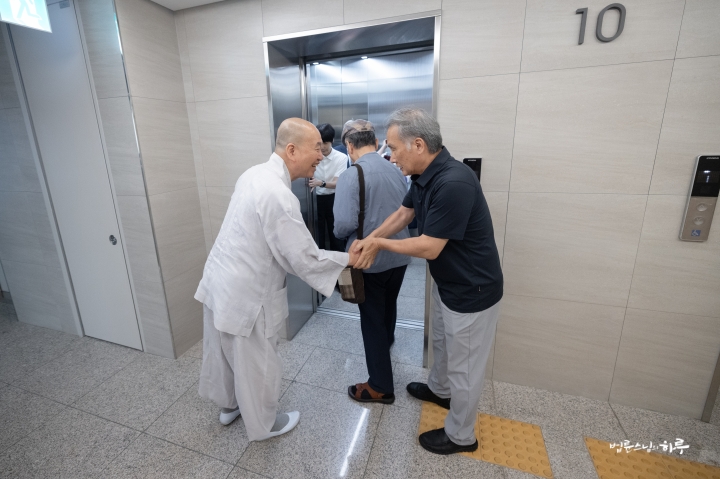
After seeing off the religious leaders, Sunim headed to the Dharma Hall on the third floor.
At 10 AM, with about 140 people gathered in the Dharma Hall, the Weekly Dharma Assembly began with the recitation of the Three Refuges and the Heart Sutra. Jungto Society members also participated online by joining the video conference.
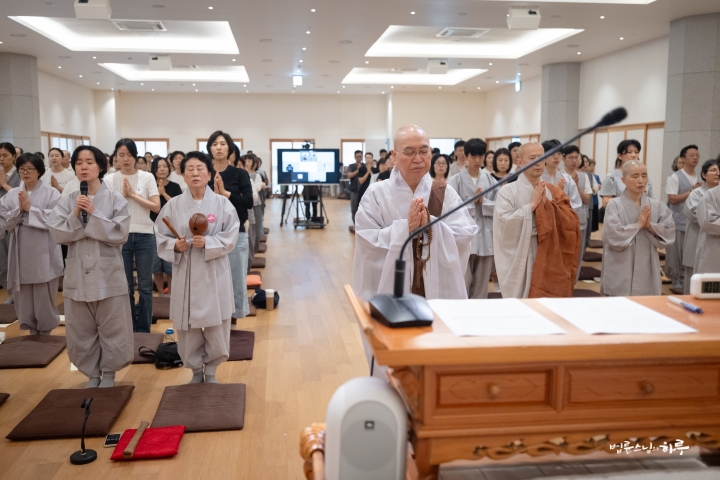
After the Jungto Society President reported on national meeting resolutions, everyone watched a video of weekly Jungto practitioner news together.
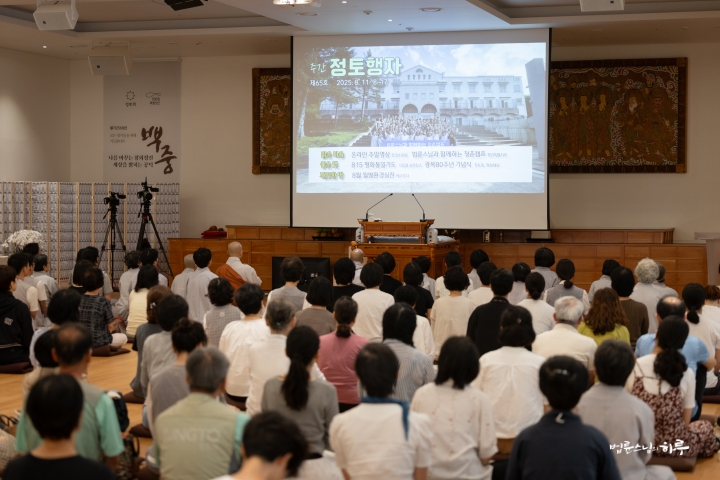
When the assembly requested a Dharma talk with three bows, Sunim began the teaching.
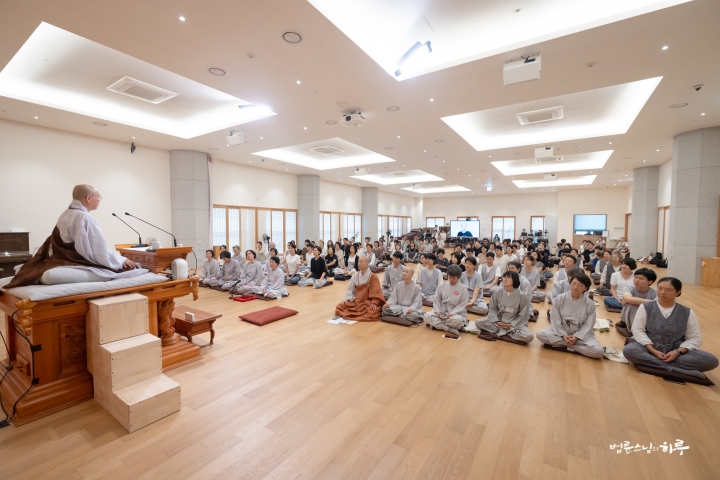
“The intensity of the hot summer seems to have broken. While it’s still hot, the scorching heat has definitely passed. So the current heat is bearable, isn’t it? However, inside sun-heated buildings, especially the top floors, still feel like saunas exceeding 40 degrees.
September 7th is the opening ceremony for the last 100-Day Prayer of the first 1000-Day Practice. If you join the 100-Day Prayer and participate in the 1000-Day Practice this time, you’ll be able to say later when the 10,000-Day Practice ends, ‘I participated from the first 1000-Day Practice.’ However, if you miss this 100-day period and join from next spring, you’ll be participating from the second 1000-Day Practice. I encourage graduates of the Jungto Buddhism Course and Sutra Course who haven’t yet joined the 1000-Day Practice to start with this 100-Day Prayer and at least make it into the first 1000-Day Practice by the skin of your teeth. For those already participating in the 1000-Day Practice, since this is the last 100-Day Prayer, please make sure to participate and resolve, ‘I will practice diligently without missing a single day during these 100 days.'”
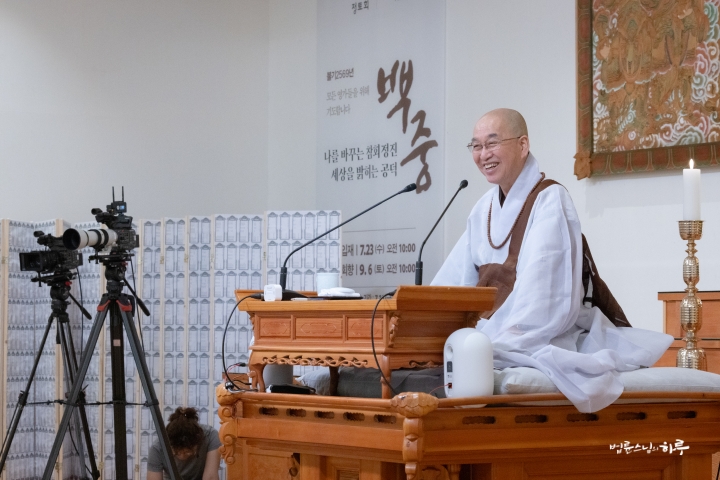
Next, Sunim took questions from those who had submitted them in advance. First, two people asked questions online, followed by two people who raised their hands at the venue. One of them sought Sunim’s advice on how to live as a descendant after discovering that their great-great-grandfather was a pro-Japanese collaborator, feeling heavy-hearted and ashamed. The questioner began to speak with difficulty, tears welling up in his eyes.
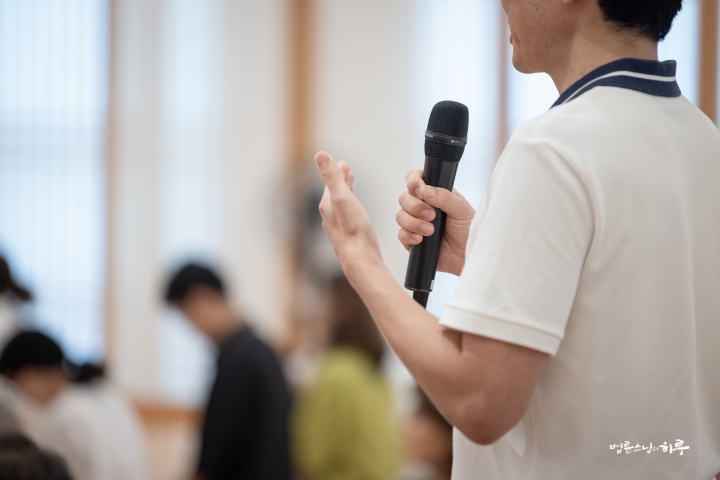
As a Descendant of a Pro-Japanese Collaborator, How Should I Live to Atone?
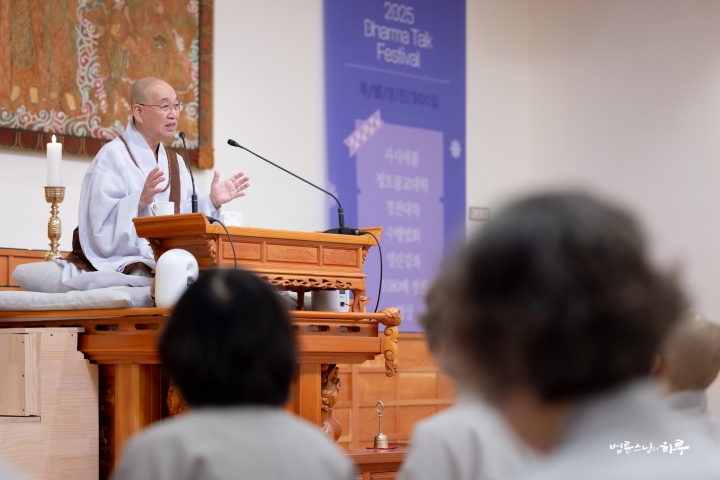
“If a young person discovers that their ancestor was an independence fighter, they would feel pride. Conversely, like you, if someone discovers their ancestor was a pro-Japanese collaborator, it wounds their heart. Understanding this principle helps us not to live only for immediate gains, no matter how attractive money and fame may be. We must live with consideration for our descendants and future generations. Life doesn’t end when we die, does it? If I am a teacher, I should live a life that my students can be proud of, and genealogically, one that my descendants can take pride in. Even if it’s not something to be proud of, it’s important to live a life that is at least not shameful and doesn’t become a burden to others. Through this question, we can see that passing down pride to our children is far more important than passing down wealth.
Let me share some words for you. The Constitution and laws of the Republic of Korea stipulate that children should not be held responsible for their parents’ crimes. Holding relatives of criminals responsible is called ‘guilt by association’ (yeonjaje). In the past, there were sayings like ‘If one commits treason, three generations will be exterminated’ or ‘nine generations will be exterminated.’ Three generations (samjok) generally refers to three direct generations – father, son, and grandson – while nine generations (gujok) refers to a broader range of relatives including maternal and paternal families. In the past, relatives suffered together for one person’s crime through such collective responsibility. However, the Constitution of the Republic of Korea prohibits guilt by association.
Of course, during the dictatorship era, this wasn’t well observed due to North-South tensions. If parents had engaged in leftist activities or relatives were North Korean officials, descendants faced restrictions in entering military academies or advancing to key government positions. While there were no problems with farming or business, there were restrictions on positions related to state secrets. Even if a sibling violated the National Security Act while participating in student movements, it created obstacles to entering public service. However, such guilt by association has now almost disappeared.
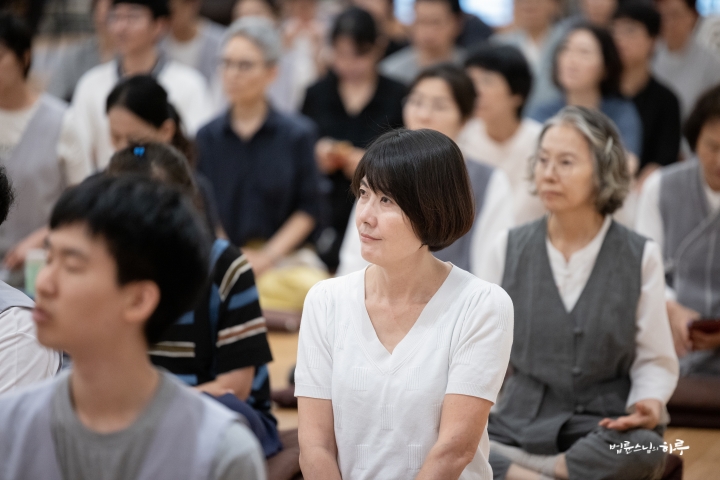
Since you are from the great-grandchild generation, this matter already spans more than three generations. While your ancestor’s pro-Japanese activities are not something to be proud of, you don’t need to feel guilty about something you were not involved in. While I take responsibility for my own wrongdoings, taking responsibility for the mistakes of parents or grandparents does not align with the principles of a democratic society.
The reason Japan reacts against our anti-Japanese sentiment is similar. Most Japanese who tormented Koreans during the Japanese colonial period are no longer alive. The majority of today’s Japanese population was born after liberation in 1945, and even those from earlier generations were just children at that time. Yet if we continue to demand apologies, they naturally react with “What did I do wrong?” Their only “fault” is being born in Japan. While we can hold the Japanese government historically accountable, it’s not appropriate to hold individual Japanese citizens responsible at this point, as most of the actual perpetrators have already passed away.
Similarly, while in the past people were discriminated against as “leftists” or “pro-Japanese collaborators” because of their parents’ or ancestors’ actions, modern South Korea is a democratized society, and the Constitution prohibits guilt by association. Therefore, you don’t need to feel guilty about your ancestors’ actions in which you had no direct involvement.
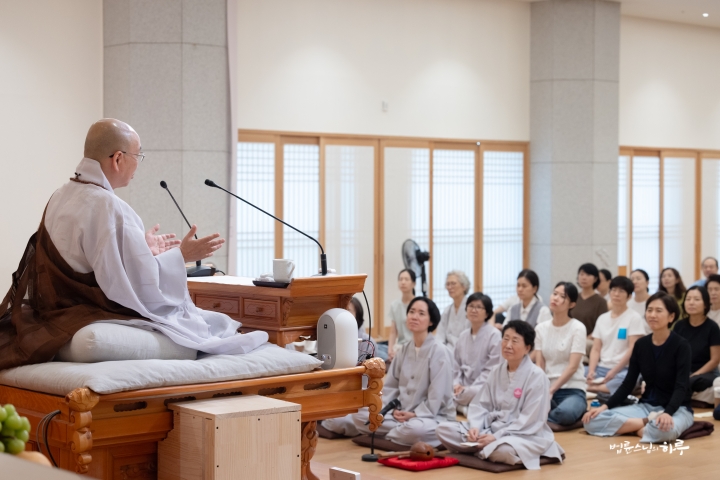
However, it cannot be said that they are completely unrelated. This is because you may have received economic benefits. If your ancestor was a high-ranking official during the Japanese colonial period, they would have had property. Unlike North Korea after liberation, South Korea recognized private property, so it wasn’t completely confiscated. As a result, many pro-Japanese collaborators were wealthy, while independence activists often lost their family fortunes by investing in the independence movement or having their property confiscated by the Japanese. Consequently, even after liberation, many descendants of independence activists suffered from poverty and lack of educational opportunities, and some still live in poor conditions today. Currently, the government provides some support for them, but it’s still insufficient. Recently, there have been demands to extend support to descendants of the Donghak Peasant Movement and anti-Japanese righteous armies, raising concerns about the scope becoming too broad.
Of course, such support is necessary. However, we cannot support descendants of those who sacrificed during the Japanese invasions of Korea in the 16th century. Support for descendants is necessary for events within about 100 years, but extending beyond that is unreasonable. In such cases, we should approach it from a public perspective, such as restoring the honor of the Donghak Revolution, rather than individual welfare. Additionally, if it’s clearly proven that pro-Japanese forces accumulated wealth through their service to Japan, the state can reclaim that property. However, from the descendants’ perspective, they resist demands to suddenly surrender property in their or their parents’ names due to private property protection issues. While movable property like cash is difficult to touch, real estate such as land owned by clan organizations can be subject to reclamation.
If you’re not in this situation, that’s fortunate. If you are, rather than resisting and claiming ‘It’s mine!’ because you don’t want to give up the property, if you’ve already received many benefits, you should have an attitude of returning some to society. If there’s no property to be reclaimed, that in itself is fortunate. Having no property to be reclaimed is not a crime. Just as having no money to repay a bank loan is not a crime, but having money and not repaying is a crime, not having something is not a crime. So if you have property inherited from your ancestors, you can donate it to the state or return it to society. There’s absolutely no need for individuals to feel guilty. With this perspective, I hope you live actively as a young person in free South Korea, no different from others.”
“Regarding property, I understand that we went completely bankrupt after liberation. So I thought it was good that we went bankrupt.”
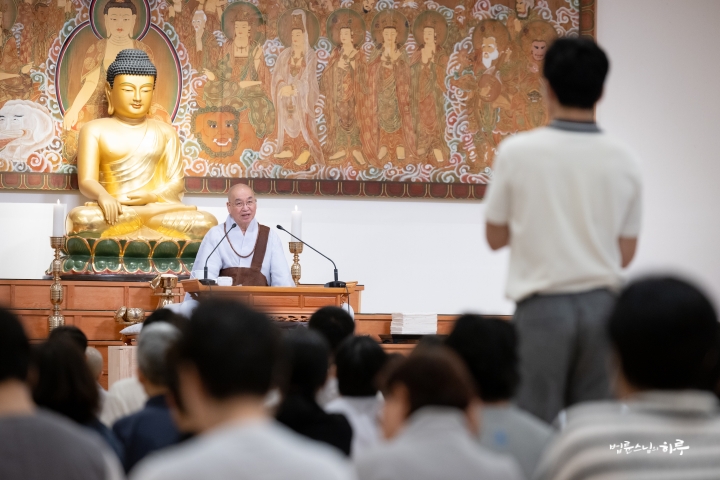
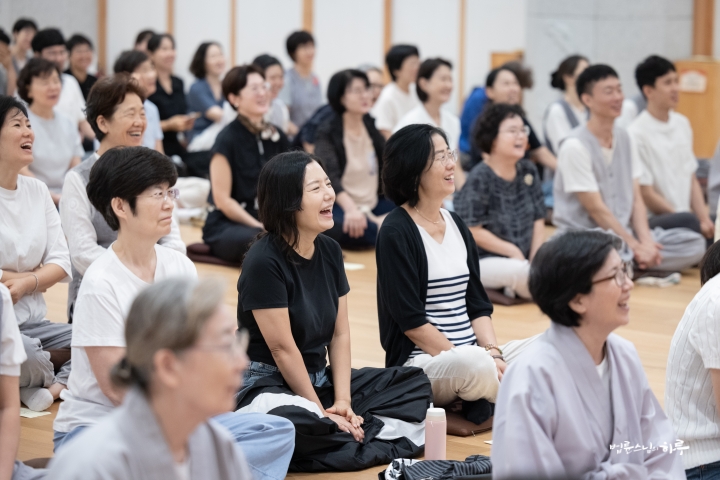
“Then there’s no problem at all. In our country, resistance to property reclamation is very strong. What you can do at this point is just that, and there’s nothing more to be responsible for. If you went completely bankrupt, it’s as if you’ve already given everything up. While it’s not something to boast about or brag about your ancestors’ actions, there’s absolutely no need to feel guilty. Since it happened 100 years ago, it’s just part of history, not something individuals should be responsible for. Please accept this and live proudly as a citizen of the Republic of Korea.”
“Yes, thank you.”
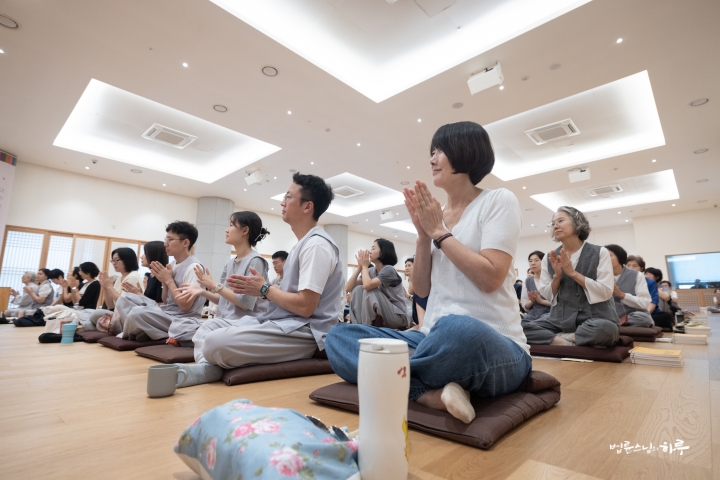
Questions continued to follow.
I want to go on a pilgrimage to India’s sacred sites, but my husband opposes me going alone. He says we should go together after he retires, but I oppose his retirement. What should I do?
I’m a graduate of the Sutra Course where I studied the Diamond Sutra. I’d like to ask Sunim if I’m thinking correctly.
For Korea’s economic growth, it seems we need to consume, but for an environmentally sustainable society, it seems we need to restrain consumption. What perspective should I have?
After finishing the dialogue, it was almost noon. The members of the Sangha had mindful sharing in groups and then performed Baekjung Prayer, while Sunim moved to the basement dining hall for lunch.
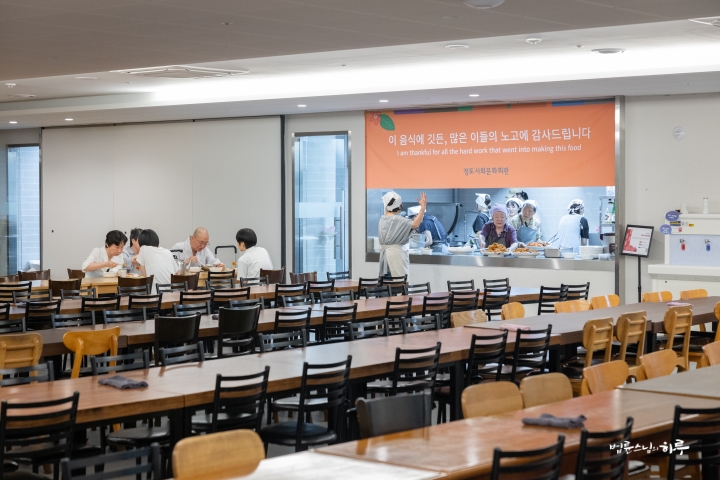
From 1 PM, Sunim attended a Peace Foundation research seminar at the Peace Foundation conference room on the topic “Republic of Korea: The War on Drugs Has Begun.”
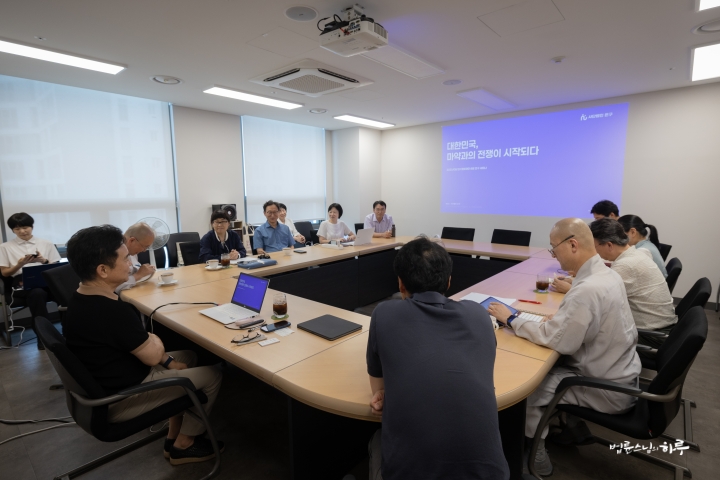
Today’s presenter was Nam Kyung-pil, former Governor of Gyeonggi Province. Now as the representative of NGU (NEVER GIVE UP), he is leading the anti-drug movement, fighting fiercely on another battlefield in life, not politics.
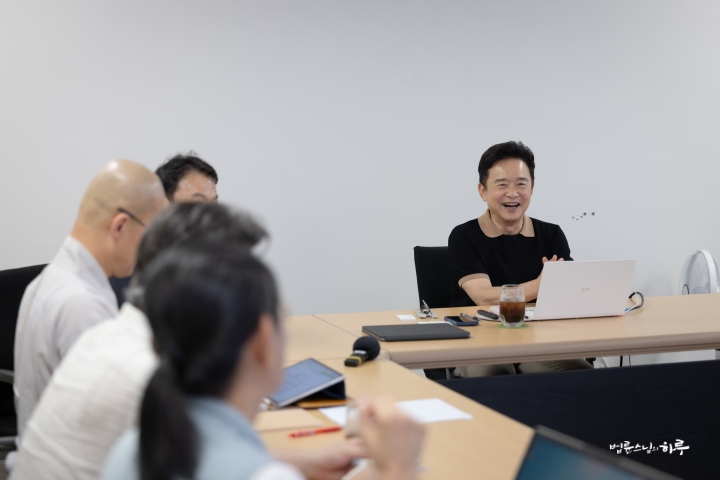
“It’s quite burdensome to present in front of Venerable Pomnyun Sunim. It feels like showing off in front of an expert. While it’s an honor to have Sunim here, I also feel the burden of wondering, ‘Am I qualified to do this?’ However, I’m someone who has already quit politics, which is said to be harder to quit than drugs. So I think I’m fully qualified to do drug rehabilitation work. (laughter)
The title of today’s talk, ‘War on Drugs,’ might sound somewhat grandiose. However, I chose this title because I think we first need to recognize how seriously drugs have spread in our society. And I’d like to discuss together what we should do in this situation going forward.”
Nam Kyung-pil’s story went beyond simple statistics or institutional criticism, starting from his tearful experience as a father.
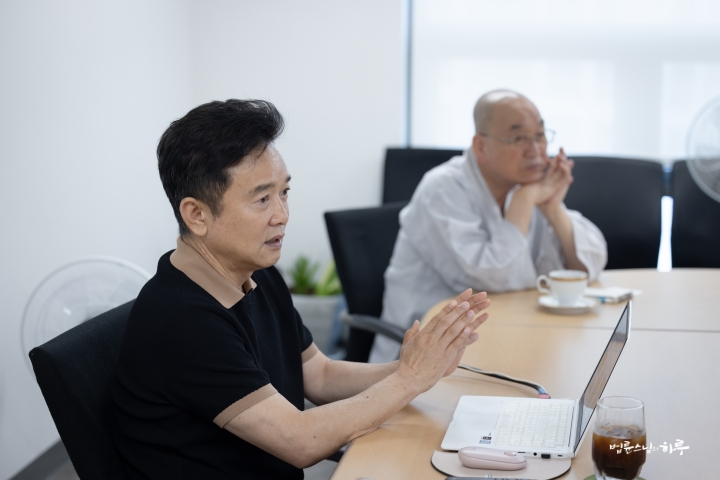
The Reason for Starting the War on Drugs: “Dad Will Never Give Up on You”
“I held on until the end to save my son. But family strength alone couldn’t pull him out of the drug swamp. Eventually, I reported my own son to the police and had him receive a prison sentence in court.”
His son surrendered twice but was released, and when entrusted to a hospital, he was forcibly discharged due to an infectious disease and returned to drugs. Each time, the family reported him again, and he was finally detained and received treatment at a prison and the National Forensic Hospital.
And his son said this last in court:
“I’m grateful that my family didn’t give up on me. I’ll get clean and work on the anti-drug movement with my father.”
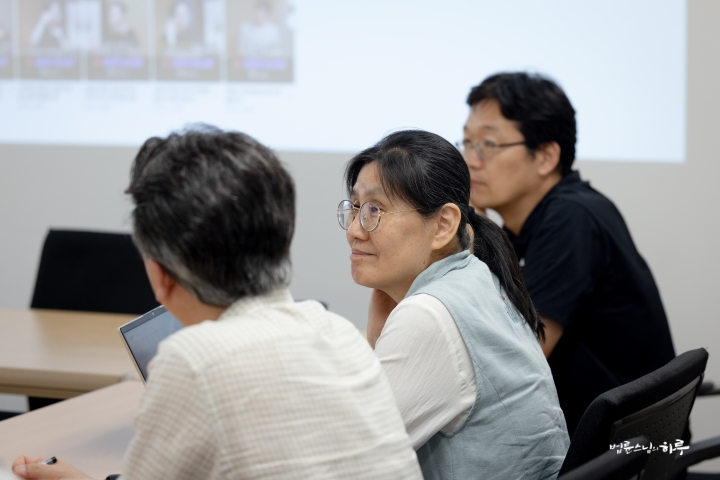
Nam Kyung-pil’s voice trembled as he spoke about this scene. The desperation of a father who never let go even in pain to not lose his son was fully conveyed.
“Actually, it wasn’t work for the country but started because of my son’s problem. When I visited my dejected son, I jokingly said this:
‘Do you know what’s hardest in politics? It’s raising name recognition. But is there anyone in Korea who doesn’t know you? Everyone knows that the former governor Nam Kyung-pil’s son is a drug addict. In terms of name recognition, you’re almost number one in Korea. If you use that bad recognition to completely quit drugs and do meaningful work for society, you could become a much more powerful messenger than your dad.’
These days, I’m gathering many such powerful messengers, not just my son, to work together. While national policies are meaningful, personally, what I’m doing now is the most rewarding and makes me happiest. My son almost died from drugs once. He was critical enough to be taken to the emergency room, but he survived, and that experience became the catalyst for his decision to surrender himself.”
Nam Kyung-pil emphasized that we must face the harsh reality our society faces.
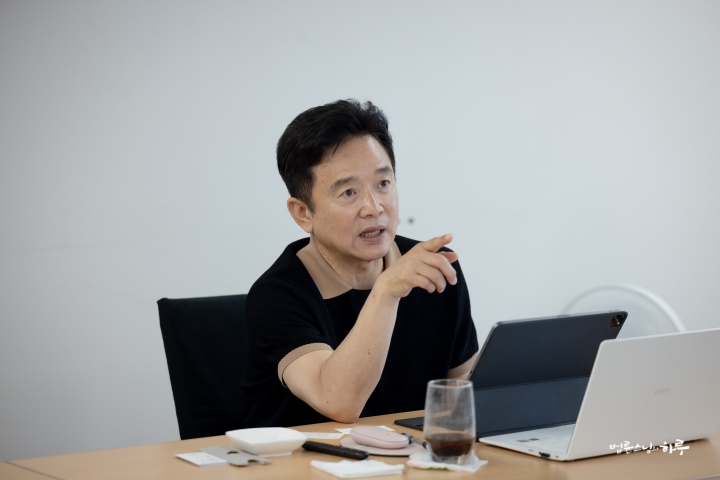
“Last year, over 20,000 people were arrested as drug offenders in our country. This year, it’s expected to reach about 30,000. While doing drug rehabilitation work and encountering various expert statistics, though there are differences depending on the counting method, this figure of 20,000 only represents those arrested and punished through the judicial system. Looking at overseas cases, the actual number of addicts is much higher. Since drugs are used in secret, many cases remain hidden. Also, considering dark figure crimes that occur secretly, if we estimate current drug addicts in Korea at 20,000 to 30,000, those who have experienced drugs could be a hundred times that number. In other words, an estimated 2 to 3 million people may have experienced drugs. I believe it’s much higher than that. Especially teenage drug offenders have increased 50-fold in the past 10 years, and the proportion of women is increasing significantly. Now is the tipping point. If we neglect this, ‘zombie streets’ could appear in our society.”
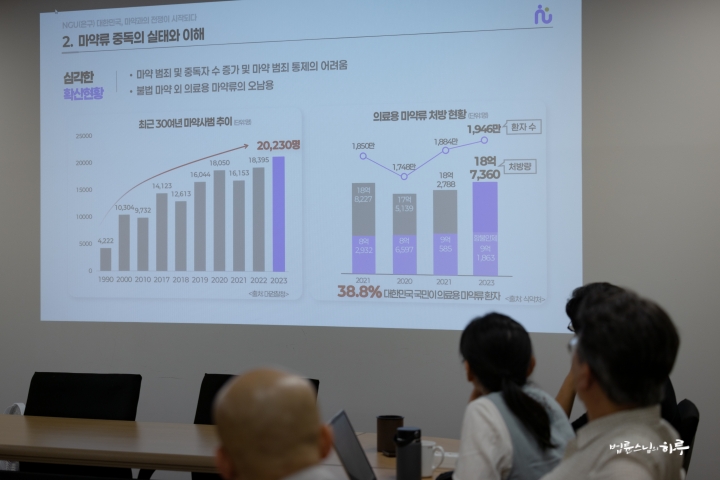
He particularly emphasized that while marijuana was the gateway drug in the past, medical psychotropic drugs have now become the gateway for teenagers and young people.
“Representative examples are ADHD (Attention Deficit Hyperactivity Disorder) medication and diet pills (commonly called ‘butterfly pills’). ADHD medication has been disguised as ‘study-enhancing drugs’ and is being abused among high school and college students. They start with one pill at a time, increase the dosage, and eventually, many cases lead to drug re-addiction. Diet pills are spreading through group purchases among office workers, especially women, and are being consumed indiscriminately. Originally prescribed short-term for severely obese patients, these narcotic drugs are spreading like everyday items under social pressure to be thin.”
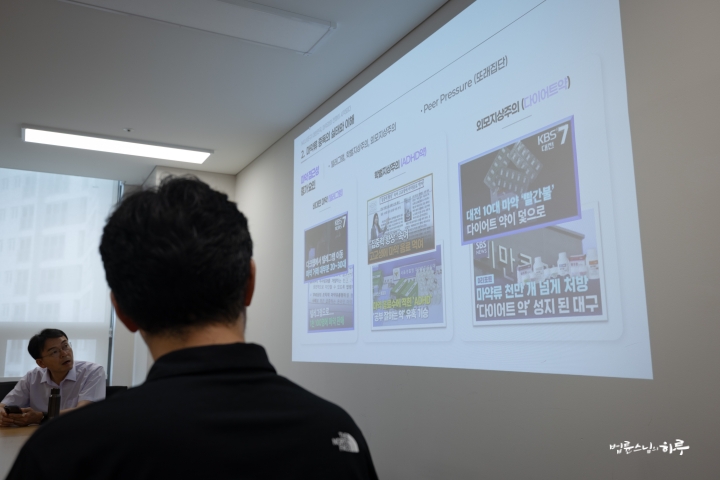
Representative Nam explained that nowadays anyone can easily obtain drugs with just Telegram.
“With the so-called ‘throw’ method becoming prevalent, after depositing money, they tell you the coordinates of drugs hidden at specific nearby locations, and this method of going to find them yourself has become common. As digital platforms combine with non-face-to-face transaction methods, drugs are no longer a problem of specific classes but are penetrating into daily life.
As an international threat, there’s fentanyl. Fentanyl is a powerful narcotic painkiller also used in cancer surgery, and just 0.02g can be fatal. In the United States, more people die from fentanyl addiction than from traffic accidents or gun incidents. The structure involves China producing precursor chemicals and sending them to secret laboratories in Mexico, where they’re synthesized and refined into pills or injections, then distributed to the United States.”
While refined injection-form fentanyl hasn’t fully entered Korea yet, he emphasized that national-level response is urgently needed as it could enter at any time.
Finally, he summarized the three pillars of drug response as preventive education, judicial punishment, and healing and social reintegration. For preventive education, he opened a YouTube channel called ‘Inoma (Now No Drugs)’ to produce dialogue content with addicts, families, police, and experts participating together, and is encouraging celebrity participation. Regarding judicial punishment, he pointed out deficiencies in the judicial system, mentioning how surrenders don’t count in performance records and are ignored, and his experience of political misunderstanding due to arrest warrant rejections. For healing and social reintegration, he’s preparing a healing community model combining medical treatment, relationship recovery, and vocational rehabilitation in cooperation with Seoul National University Bundang Hospital.
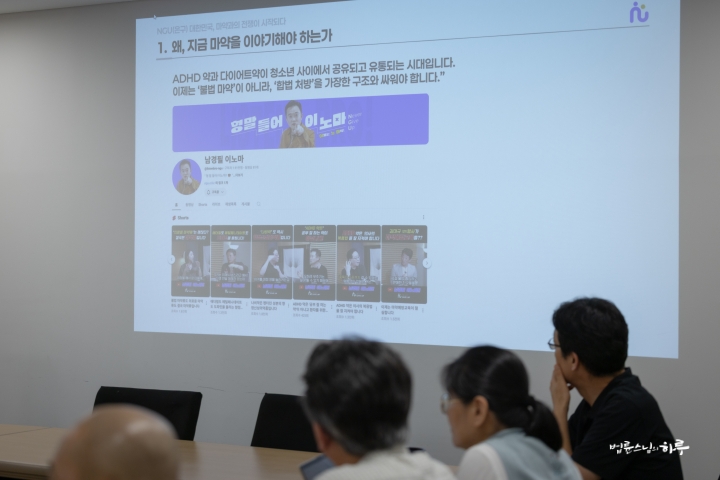
After a two-hour lecture, there was a Q&A session. Sunim emphasized that the drug problem should be viewed in a larger social context.
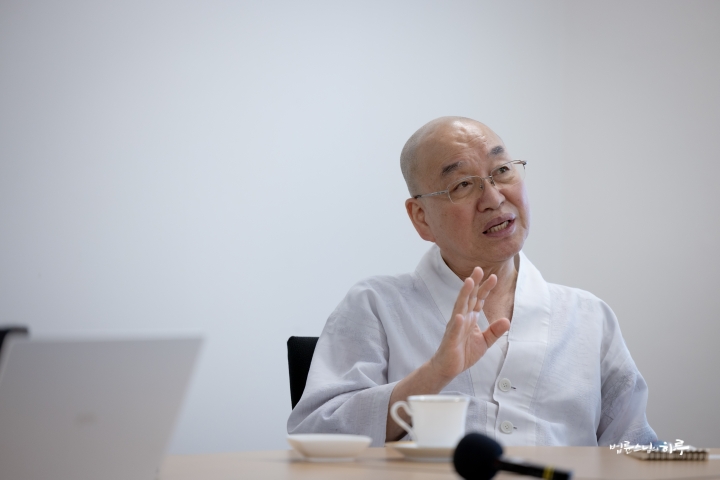
“Countries like Germany and the UK have government departments called ‘Ministry of Loneliness.’ So I thought that instead of establishing a Drug Agency, our country should establish a Loneliness Agency, with a Drug Bureau, Suicide Bureau, and Depression Bureau under it, approaching comprehensively. In Europe, these issues are already being addressed as major social welfare challenges. Rather than dealing with drugs, suicide, and depression separately, I think we need an approach that comprehensively views human loneliness and deficiency.”
Sunim pointed out anxiety and mental illness as fundamental causes of addiction.
“If we don’t heal mental anxiety and emptiness, addiction to alcohol, tobacco, drugs, etc. will continue to repeat. Psychological therapy along with medication is essential.”
One participant emphasized that drugs should be viewed not as simple crimes but as structural problems created by a performance-centered society, stressing the need to transform the entrance exam and competition culture. Another pointed out that psychological therapy and medication are disconnected due to role conflicts between doctors and counselors, noting the need for a new institutional framework to connect them.
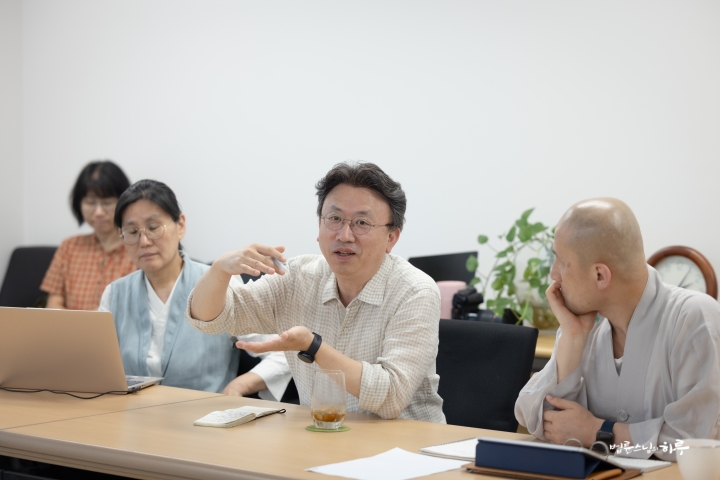
Another participant appealed about the atmosphere in schools where ADHD medication is implicitly encouraged and the reality of teenagers being exposed to drugs in loneliness. The common awareness revealed through various discussions was that the root of the drug problem lies not in individual deviation but in social environment and loneliness.
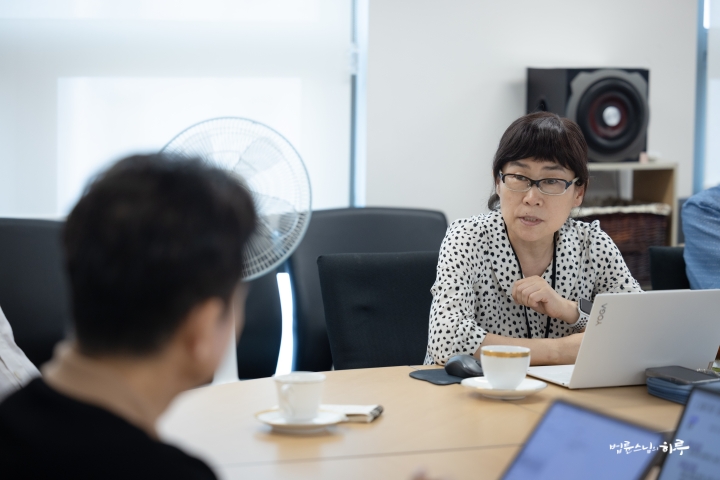
Finally, as the seminar concluded, Sunim shared some thoughts.
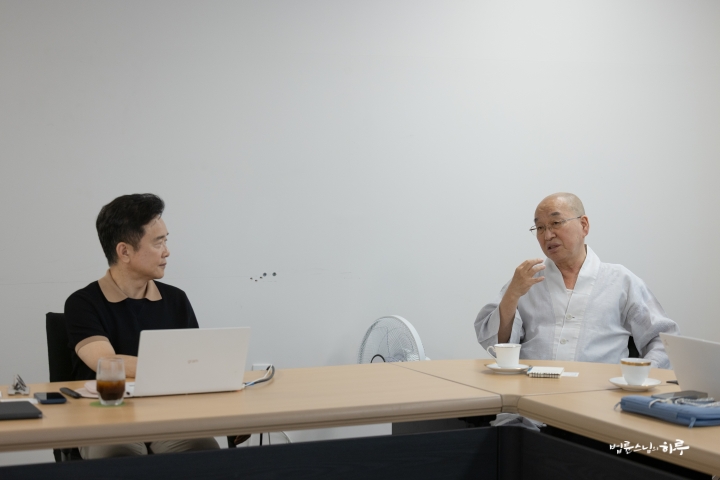
“I have several thoughts after listening to the representative today. First, while I knew from the news that drug addicts were increasing, I realized it’s actually much more widespread and serious. Second, while I knew psychotropic drugs were problematic, I hadn’t thought about them being the foundation for drug proliferation. I only knew that some doctors were diverting drugs, but I was really shocked to hear that many students routinely take ADHD medication. I can’t believe that today’s students habitually take ADHD medication like we used to take stay-awake pills when studying for exams, so I feel I need to verify this directly. I also think we need to examine more closely the actual situation regarding diet pills containing narcotic ingredients that can lead to drug temptation with long-term use.
Once drugs begin to spread beyond being a drug-free country, it’s very difficult to control. While $1 is enough for prevention, even $10,000 isn’t enough for healing. It’s a huge burden financially for the nation and tremendous suffering for individuals. In that sense, the representative’s awakening of our awareness today is very meaningful. I think you’re doing greater work for the nation than in your role as governor.”
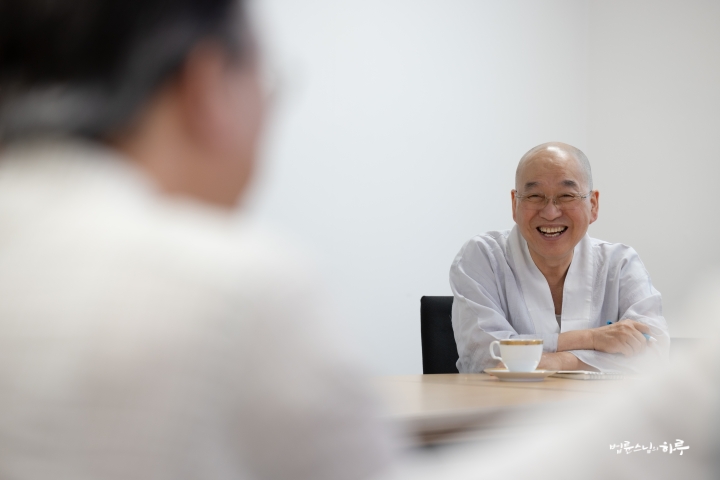
As the seminar concluded, Representative Nam Kyung-pil made another heartfelt appeal.
“When you believe ‘I can quit drugs with my own willpower,’ you can never actually quit. Only when you face a near-death situation do you painfully realize, ‘I can’t do this on my own.’ Without experiencing such extreme circumstances, it’s difficult to break free from drugs. I believe that saving even one more suffering person is the most meaningful work. My son will be released on October 1st, and we plan to carefully begin this work together. I ask for your support.
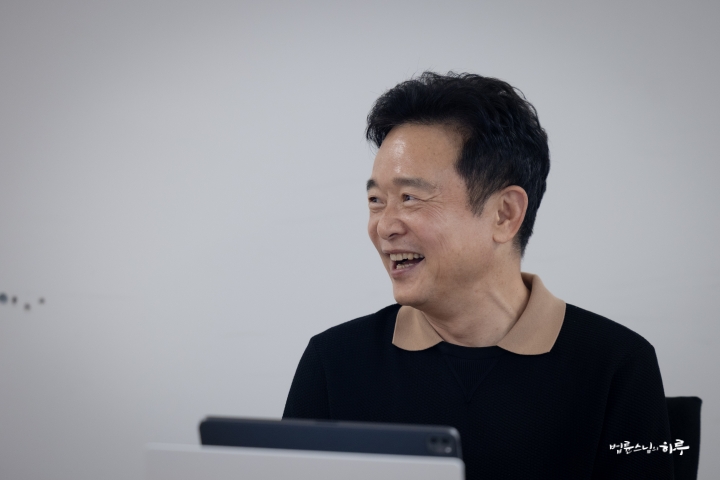
What was most rewarding today was that Venerable Pomnyun Sunim recognized how dangerous medical narcotics can be and how they can become the starting point for greater addiction. Only with this understanding can we take the first step in preventing drug addiction. I’m truly reassured that Sunim listened to my story for such a long time and will be a strong supporter going forward. Thank you.”
Sunim recommended that Representative Nam send his son to the Awakening Retreat.
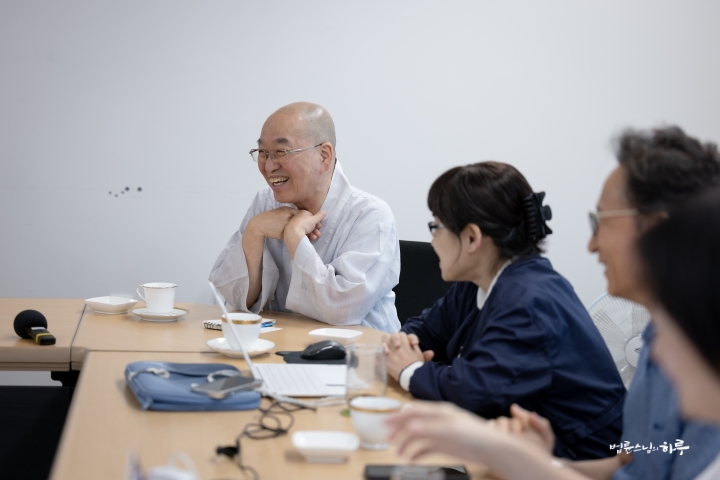
“When your son is released, he should attend the Awakening Retreat first. The fundamental problem can only be solved when the anger and emptiness in his heart disappear. He may have quit drugs during his two years in prison, but the psychological habits might remain. When someone who spent three years in prison comes out, even though all the nicotine has left their body, the habit hasn’t. That’s why the first thing they do upon release is smoke a cigarette, saying it finally feels like they’re really out. This isn’t because nicotine remains in their body, but because of psychological satisfaction. If this isn’t healed, the vicious cycle will repeat.”
“Yes, I will definitely send my son to the Awakening Retreat.”
Today’s seminar left a deeper impression than any statistics or figures could – the father’s desperate desire to save his son and countless others like him, and Sunim’s insight that we must look beyond drugs to address loneliness and deprivation. Everyone gave a big round of applause to Representative Nam Kyung-pil for conducting the seminar with such passion for three hours.
Sunim presented gifts of rice he had grown himself, his books, and a collection of Korean proverbs. Representative Nam smiled as he received Sunim’s books and said,
“I’ve read Sunim’s books and gained great enlightenment, and I’m living exactly as Sunim taught.”
They agreed to meet again at a public lecture venue and bid farewell to Representative Nam.
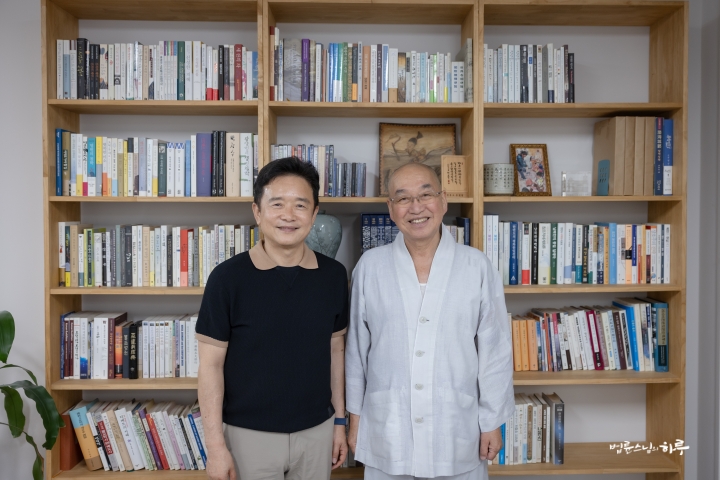
Immediately after, at 4 PM, Sunim attended The Peace Foundation Planning Committee meeting. They discussed the current political situation in South Korea and potential changes in inter-Korean and US-North Korea relations following the upcoming Korea-US summit, spending two hours discussing The Peace Foundation’s role in these developments. By the time the meeting ended, the sun had set.

At 7:30 PM, Sunim conducted the evening Weekly Dharma Assembly live broadcast. About 100 people gathered in the third-floor Dharma Hall, while Jungto Society members connected via online video conference. They requested a Dharma talk from Sunim with three prostrations.
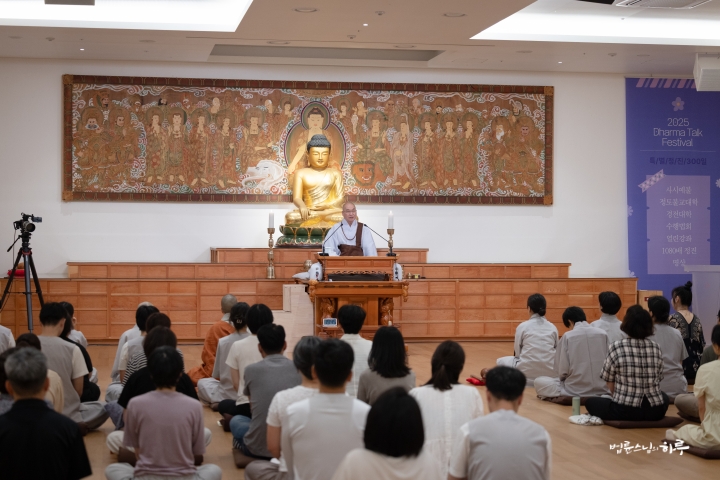
Like in the morning assembly, Sunim shared news about the upcoming 100-Day Prayer opening ceremony and Youth Festival, then took questions from Jungto Society members. Four people asked questions online.
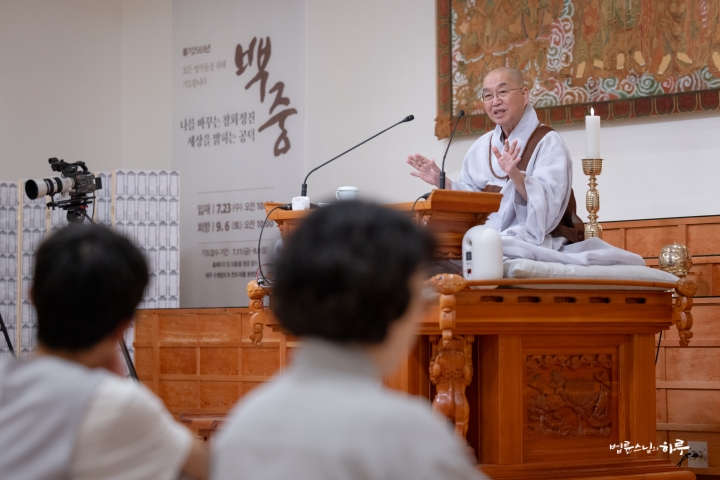
I think it would be better not to participate in other countries’ wars. What efforts should we make to avoid participating in other wars?
I attempted suicide due to conflicts with my father in childhood, had panic disorder in my 20s, and now exercise after stopping medication. Can I go on a pilgrimage?
I’m curious about where Sunim uses the economic recovery consumer coupons and what mindset we should have when using them.
Was Buddha’s final teaching of ‘continuous diligent practice’ being compared to dripping water Venerable Pomnyun Sunim’s metaphorical expression, or is it actually recorded that way in another version of the sutras?
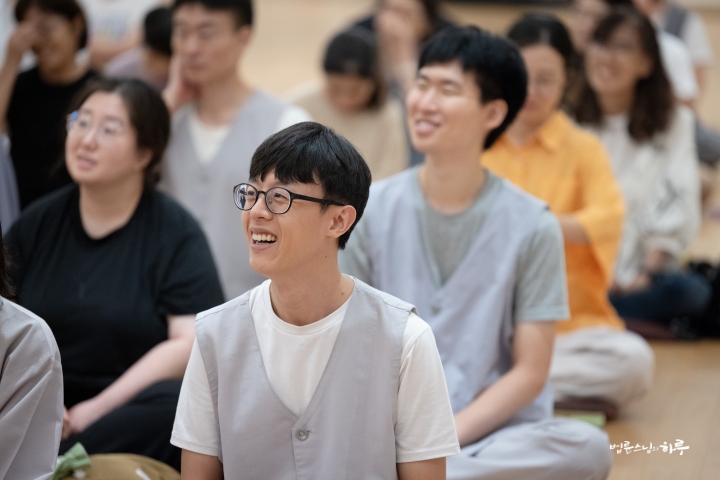
After conversing with those who had submitted questions in advance, one person from the audience raised their hand and asked a question directly.
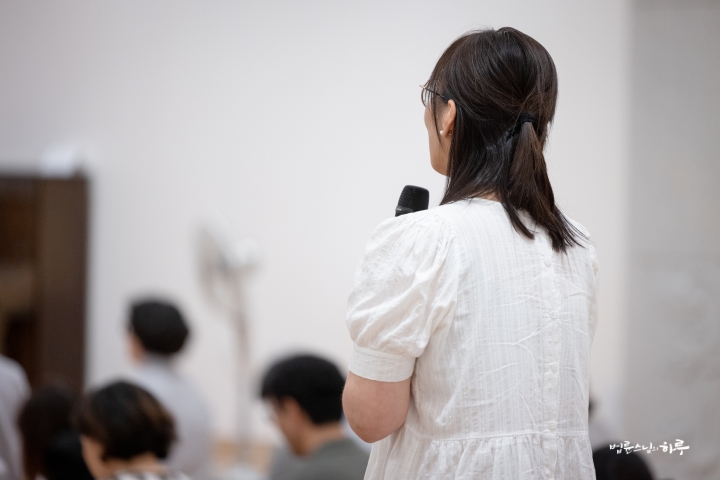
Is It My Greed That My Prayer Is Getting Longer and Longer?
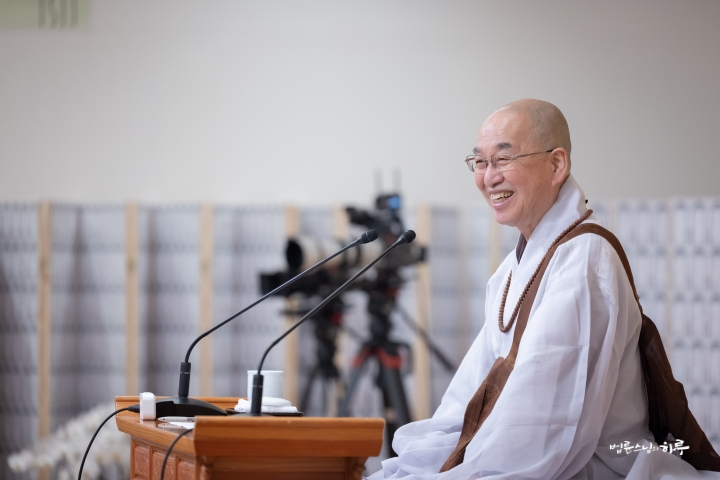
“There’s no right or wrong answer. If you want to do it that way, go ahead. This isn’t a matter of right or wrong. In fact, everything we do in life is thanks to someone’s help. So you could make your prayer just one line like ‘I’m grateful to be alive,’ or you could add ‘I’m grateful to my parents,’ ‘I’m grateful to my husband,’ ‘I’m grateful to my children,’ ‘I’m grateful to farmers,’ ‘I’m grateful to workers,’ ‘I’m grateful to heaven and earth and nature.’ If you keep adding things because you want to, like you’re doing, it might eventually become a whole book. That’s fine too. (Laughter)
However, if we’re talking about Words to Remember (Myeongshimmun), it’s typically expressed concisely in one sentence to focus on one thing. Like ‘Thank you’ or ‘I’m grateful to be alive’ – expressing it in one sentence. Of course, if it’s a vow or aspiration, adding various things isn’t wrong. But it could be evidence that you have many desires.”
“Yes, I understand.”
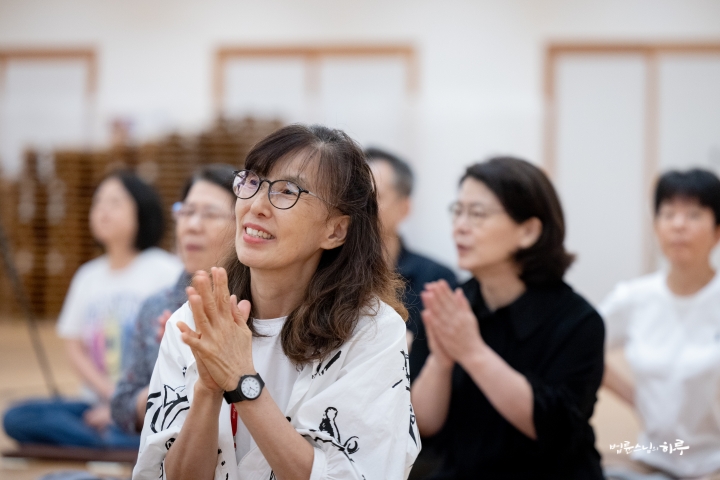
By the time the dialogue ended, it was well past 9 PM. The assembly members sat in circles by group for mindful sharing and then performed Baekjung Prayer, while Sunim left the Dharma Hall and headed to the Jungto Center.
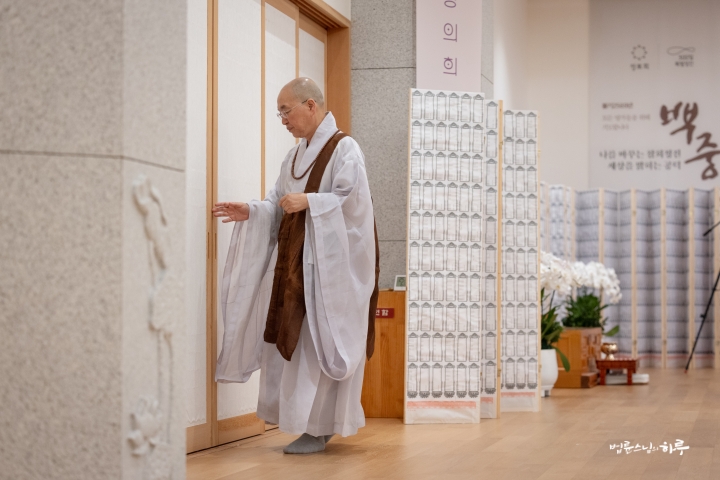
Tomorrow, Sunim will have an early morning breakfast meeting with North Korea experts at The Peace Foundation, meet with foreign affairs and security experts in the morning, have conversations with guests visiting The Peace Foundation in the afternoon, and in the evening, have dinner with JTS volunteers who will be dispatched to Bhutan the day after tomorrow to discuss second-half business plans.





